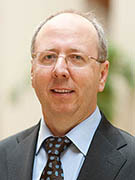Robert Pirker is currently Professor of Medicine and Program Director for Lung Cancer at the Department of Medicine I, Medical University of Vienna, Austria. He obtained a master’s degree in Biochemistry in 1978 and his medical degree in 1979 from the University of Vienna. Robert Pirker trained in Internal Medicine, Hemato-Oncology and Nuclear Medicine at the University of Vienna. He also worked as NIH Visiting Fellow at the Laboratory of Molecular Biology (Chief: Dr. Ira Pastan), National Cancer Institute, Bethesda, MD, USA (1983-86).
He specializes in Hemato-Oncology. His research focuses on drug resistance mechanisms in patients with cancer, chemotherapy and targeted therapy of lung cancer, predictive factors in lung cancer, and anaemia management in patients with cancer. As a member of the IALT-Bio and LACE-Bio groups, he has been involved in the characterization of predictive factors with regard to adjuvant chemotherapy in patients with completely resected NSCLC. He was also the world-wide Co-ordinating Investigator of the FLEX trial.
Robert Pirker has published more than 150 articles, reviews or book chapters. He is an Editorial Board Member of Lung Cancer, and has been an ESMO Faculty Member on Chest Tumors and a member including chair of the IASLC Education Committee. He was Congress President of the 8th Central European Lung Cancer Congress in 2002 and Chair of the Scientific Committee of the European Multidisciplinary Conference on Thoracic Oncology in 2009. He was the Congress President of the 14th Central European Lung Cancer Congress in 2014 and will be the Congress President of the 17th World Congress on Lung Cancer in 2016 in Vienna, Austria. He is also Chair of the Steering Committee of the recently launched Central European Initiative against Lung Cancer. Robert Pirker has received several scientific awards and has been a member of ESMO, ASCO and other scientific societies for many years.

